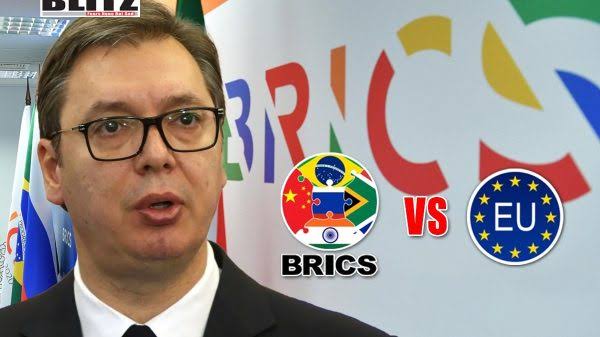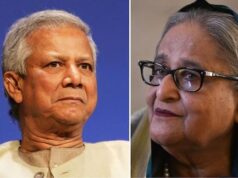Serbia eyes BRICS as real alternative to the EU

By Sonjib Chandra Das
Serbia is considering an alternative path to the European Union by exploring the possibility of joining BRICS, a rapidly expanding economic bloc that now presents a viable counterweight to traditional Western institutions.
Deputy Prime Minister Aleksandar Vulin highlighted Serbia’s frustration with the EU’s seemingly unending demands and lack of progress toward membership, signalling that the BRICS group could offer a new and fruitful path forward for the country.
Serbia’s journey toward EU membership has been long and tumultuous. The country applied for membership in 2009 and became a candidate in 2012.
Since then, however, Brussels has increasingly tied Serbia’s accession to a range of conditions that have alienated many in Belgrade. The most prominent of these conditions is the normalization of relations with Kosovo, which declared independence from Serbia in 2008.
Serbia, however, refuses to recognize Kosovo as a separate state.Over time, the EU has escalated its demands, pressuring Serbia to acknowledge Kosovo’s independence in de facto terms.
Additionally, Brussels has been criticized for failing to protect the rights of ethnic Serbs in Kosovo, adding to the frustration in Belgrade. For many Serbians, the process of joining the EU has felt like a political maze with no clear exit, especially as Brussels has linked Serbia’s accession with breaking ties with Moscow and imposing sanctions on Russia.
These are conditions that Vulin believes Serbia simply cannot meet.“Just tell us: ‘we don’t want you,’” Vulin told Berliner Zeitung in a recent interview. “Why do you keep setting us conditions that we cannot fulfil? We see the EU as a partner, but we are not entirely sure that the EU sees us as a partner.”
While the EU has demanded that Serbia sever ties with Russia, Vulin highlighted a key distinction: Moscow has never made similar demands. Russian President Vladimir Putin, according to Vulin, has not pressured Serbia to choose between Europe and Russia, nor has Moscow threatened to end relations if Serbia pursued EU membership.
This difference in approach has not gone unnoticed in Belgrade, where many see the EU’s demands as a violation of Serbia’s sovereignty.“At the same time, EU negotiators are telling us: ‘If you do not break off relations with Russia, you will not join the EU,’” Vulin complained.
“So are we partners or not? Or do we not have the right to our own interests?”BRICS, which started as a simple acronym in 2001 to describe the emerging markets of Brazil, Russia, India, and China, has since grown into a robust informal alliance with significant global economic clout.
South Africa joined the group in 2011, and in 2023, the bloc welcomed new members including Egypt, Iran, Ethiopia, and the United Arab Emirates. Saudi Arabia is also in the process of finalizing its accession.
The BRICS nations have collectively overtaken the US-led G7 in terms of their share of global GDP and have established a development bank to fund projects within member states.
BRICS has now evolved from a group of large emerging economies into a coalition that is appealing to a wide range of countries from different regions of the world. From Algeria and Argentina to Türkiye and Bangladesh, numerous nations have either expressed interest in joining or have begun the application process.
Notably, Türkiye became the first NATO member state to apply for BRICS membership in 2023, signalling the group’s growing appeal beyond its traditional base.
Serbia’s interest in BRICS is both strategic and pragmatic. The country has long maintained strong ties with Russia, one of BRICS’ founding members, and sees potential benefits in joining a group that is not beholden to Western powers or institutions.
Vulin made it clear that Serbia’s participation in BRICS would allow it to explore new possibilities and avoid the political and economic constraints imposed by the EU.Serbia plans to attend the BRICS summit in Kazan, Russia, later this month to engage in discussions about possible membership.
For Vulin, exploring the BRICS option is not only logical but necessary.“It would be irresponsible if we did not explore all possibilities, including BRICS membership,” Vulin said.
“If BRICS is attractive to other countries, for example, the Emirates or Saudi Arabia or Türkiye, why should it be any different for Serbia? There is no doubt that BRICS has become a real alternative to the EU.”Serbia’s potential pivot toward BRICS comes at a time when global alliances are increasingly shifting.
The rise of BRICS reflects broader geopolitical changes, as countries in the Global South and beyond seek alternatives to Western-dominated institutions like the EU and NATO.
For many countries, BRICS offers not only economic benefits but also a chance to participate in a multipolar world order, free from the influence of the US and its European allies.
The fact that Türkiye, a NATO member, has applied for BRICS membership is significant. It underscores that even countries traditionally aligned with the West are beginning to look for alternatives.
Serbia, with its long-standing ties to both Russia and the EU, finds itself in a similar position. As Brussels continues to tie Serbia’s future to conditions that many in Belgrade view as unreasonable, BRICS is becoming an increasingly attractive option.
Serbia’s exploration of BRICS membership marks a significant shift in its foreign policy. While the EU remains an important partner, the frustrations of the past decade have pushed Serbia to consider new alliances.
BRICS offers an opportunity to engage with a growing economic bloc that prioritizes multi polarity and respects the sovereignty of its member states.
For Serbia, joining BRICS could open up new economic opportunities, strengthen its geopolitical standing, and offer a way out of the stagnation it has faced in its EU accession process.
As the global balance of power shifts, Serbia’s decision to explore BRICS membership signals its desire to diversify its alliances and carve out a more independent path on the world stage.
Whether Serbia ultimately joins BRICS or not, its interest in the bloc reflects a broader trend of nations seeking alternatives to traditional Western institutions.




